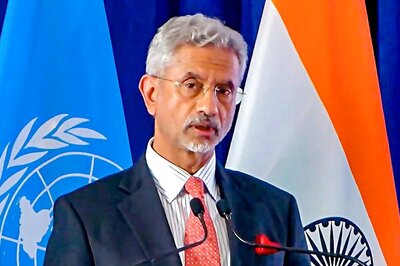
views
New Delhi: This year, an IIM-B graduate has walked away with Rs 86 lakhs per year as salary. And according to those in the know, the gravy train is all set to roll!
It is raining money - mostly on Indian Institute of Management graduates but the rest of us are hoping that some of that largesse will rub of on us, as well!
Recently, recruitments were on at the IIMs and one person from Indian Institute of Management - Bangalore is actually going to take home $193,000 or Rs 86 lakhs per year.
This year (2006), investment banks and consultancies are paying top dollar for B-school brains, as opposed to FMCGs, last year.
A total of 21 companies took part in the recruitment process, including the who’s who of global investment banking, like Goldman Sachs (London, New York), BNP Paribas (Hong Kong), Barclays Capital (London, New York, Hong Kong, Singapore), Merrill Lynch (Hong Kong, Singapore), Lehman Brothers (New York, London, Tokyo, Hong Kong), Deutsche Bank (London), ABN Amro (Hong Kong), UBS (Hong Kong, London), JP Morgan (London) and HSBC (London), which is a total of 10 investment banks.
Besides investment banks, this time consulting giants also made a beeline for the B-school.
They were by McKinsey, Bain and Co, Boston Consulting Group, Ameri Prise Financials, Deutsche Post (USA, Germany and Singapore), AT Kearney and Diamond Cluster.
IIM-B's growing reputation of producing specialist students, was underlined by the presence of private equity firms like Baring Private Equity Partners, news giant Bloomberg (New York) and conglomerates like British Petroleum (Singapore) and Mittal Steel.
This year like every other year, some sectors like marketing, retail banking, IT services and consulting continue to remain a huge draw.
So, the line up includes FMCG giants like HLL and P&G, banks like Kotak and Citibank, and consultants like Accenture and KPMG are also interested in these campus recruitments.
So, in the light of so much interest being shown, inflated salaries being handed out to rookies and experienced hands, was just a matter of time. So are these huge salaries justified or not?
Director of IIM Bangalore, Prakash Apte said, "The question whether it is well deserved or not doesn't arise because in a free economy, where a buyer voluntarily agrees to pay a certain price, this question is meaningless."
PAGE_BREAK
"This is a free negotiation between the student and the company and the company surely knows what it can get out of a student and has certain expectations from him and therefore, they are willing to go up to the level, where they think the student will add more value to their business, then that is the compensation budget they are offering him."
Partner in Amrop International, Atul Kumar agrees with this assessment and feels this salary development must be taken in the right context. He explains, "Firstly, there is broad integration in the talent market and we see that in the top-level inductions as well as board levels, and this seamless movement is happening both ways. People are coming into the country and people are going out."
"The second critical shift is why inductions are getting made, because we are moving from an economy, which was efficiency driven defined by words like productivity, cost-management and the key driver today is growth, which comes in various forms. In India, today, there is a very strong growth perception at the moment, and I think that is what people are getting paid for."
But the point is, how sustainable is this rise and what are the negatives to watch out for? India Business Consulting leader with Hewitt Associates, Sharad Vishvanath believes these kind of sky-high packages are here to stay. He says, "We have seen that the talent is priced differently now because we are looking at global pressure. Another aspect to look at is, Indian talent in global positions will also come at a similar premium, as that of top global institutes like Harvard."
So with higher pay packages come higher levels of responsibility and stress. But are students also willing to forego these high salaries and work in India for less pay? Apte says, "A fair number of our students have rejected foreign placements and decided to stay back in the country and work for less, compared to what they would have got, for a foreign placement."
He adds that the other reason why "placements are increasing are because the number of students, with prior work experience are increasing in all the campuses. So a student already has a six years of experience before he comes to the institute, who would expect to be placed laterally rather than starting at the bottom of the ladder."
"I think this trend is increasing. So the business composition of companies keeps changing over time. This year the high salary jobs were offered by investment banks and consulting companies. That has been the trend for the last few years. Some years ago, it used to be FMCG companies, which used to make the best offers. This trend will keep on changing."




















Comments
0 comment